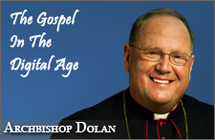 As part of the celebration of National Vocation Awareness Week, January 9-14, 2012, The Catholic Answer magazine interviewed Archbishop Timothy M. Dolan of New York on how to build a “culture of vocations.”
As part of the celebration of National Vocation Awareness Week, January 9-14, 2012, The Catholic Answer magazine interviewed Archbishop Timothy M. Dolan of New York on how to build a “culture of vocations.”
Before becoming the Archbishop of New York and president of the United States Conference of Catholic Bishops, Archbishop Dolan served as rector of the North American College, the seminary for Americans in Rome, from 1994 to 2001.
The entire interview is important reading, but I thought our readers would be especially interested in Archbishop Dolan’s insights as to what a “culture of vocations” looks like:
“What I mean by a culture of vocations is that when our young people grow up in a culture that encourages you to do God’s will and that affirms one in his desire to be a priest, you are going to get priests. I grew up in such a culture. I said to my teachers in grade school, ‘I think I want to be a priest,’ and they beamed and did everything possible to encourage me. My parish priest would. My folks would. My neighbors would. The parish would. I can remember as a kid–I must have been 9 or 10 years old–getting a haircut, and the barber said, ‘Hey shrimp, what do you want to be when you grow up?’ I said, ‘I want to be a priest.’ And he wasn’t even a Catholic, but he said, ‘Hey, isn’t that great?’
“Now that is the culture of vocations that we need in the Church.”
Readers are also invited to check out Archbishop Dolan’s blog, “The Gospel in the Digital Age.”
